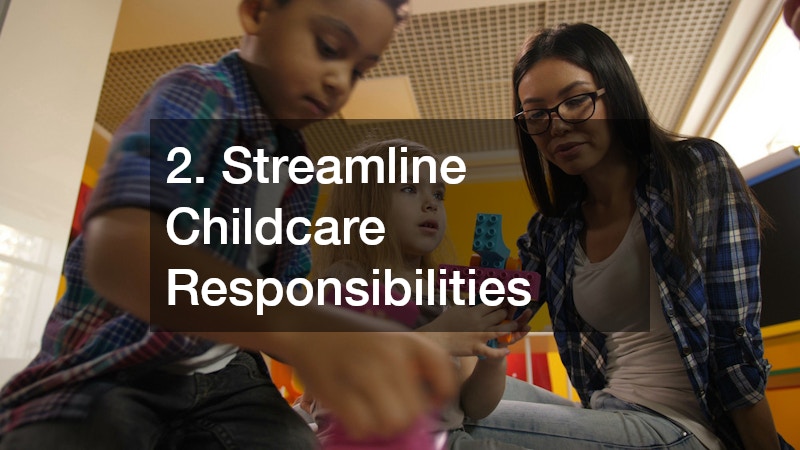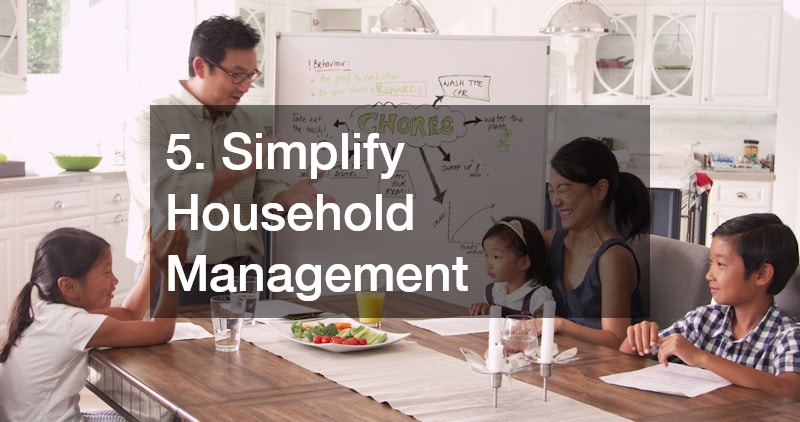Life as a busy parent often feels like you’re spinning plates while walking a tightrope. Between work obligations, caring for kids, managing household duties, and supporting aging parents, it’s easy to feel stretched thin. On top of that, many families include pets, adding another layer of responsibility. But here’s the good news: with some planning, smart strategies, and a bit of flexibility, you can navigate all of these responsibilities without losing your mind.
This guide is designed to help you prioritize, streamline, and manage your responsibilities while still finding moments of calm and connection with your family. Let’s dive in.
1. Prioritize and Plan Your Schedule
Assess Your Daily Responsibilities
Before you can manage your time effectively, you need to know where it’s actually going. Start by listing everything you do in a typical week—work hours, commuting, kids’ activities, household chores, and any commitments to aging parents. Don’t forget to include small but frequent tasks like grocery runs, school pickups, and even the time you spend scrolling social media—it all counts.
Once you have the list, separate tasks into categories: essential, important, and optional. Essentials are non-negotiable, like work deadlines or doctor’s appointments. Important tasks improve life quality, such as exercise or meal prep. Optional tasks are those that can be postponed or delegated. This assessment allows you to see where your energy is going and what you can realistically handle each day.
Use Tools to Stay Organized
Technology can be a lifesaver for busy parents. Shared family calendars—like Google Calendar or Cozi—help everyone in the household stay on the same page. You can color-code events by person or category, set reminders for important deadlines, and even link recurring appointments like weekly sports practices or caregiver visits.
Task management apps, like Todoist or Trello, allow you to break big projects into manageable steps. For example, instead of “prepare for parent-teacher conference,” you can create smaller tasks like “collect kids’ homework” and “write questions for teacher.” Checking off these mini-tasks offers a small sense of accomplishment and keeps your to-do list from becoming overwhelming.
Create a Weekly Routine
A consistent routine can help your household run like a well-oiled machine. Plan your week in advance, blocking off time for work, family activities, chores, and personal care. Some parents find that mapping out mornings and evenings is particularly effective, since those are the times when chaos tends to peak.
Don’t forget to include buffer time for unexpected events—a sick child, a delayed commute, or a last-minute meeting. Life rarely goes perfectly according to plan, so having a little flexibility built in helps you stay calm and reduces stress when things inevitably get off track.
2. Streamline Childcare Responsibilities

Evaluate Daycare and After-School Options
Choosing the right childcare is crucial for both you and your child’s well-being. Start by listing all local options— daycares, preschools, and after-school programs. Consider factors like location, hours, staff qualifications, safety protocols, and curriculum. Some families prioritize convenience, while others focus on enrichment programs or socialization opportunities.
It can also help to request a trial period or visit multiple facilities to observe the environment firsthand. Children often pick up on subtle cues, and a daycare that feels warm and welcoming can make a huge difference in their comfort and happiness.
Choosing the Right Childcare
Selecting childcare isn’t just about logistics—it’s about fit. When choosing a daycare, consider the environment, staff-to-child ratio, safety protocols, and the types of activities offered. Ask questions: How do staff handle conflicts? What are their policies for sick days or emergencies? How do they communicate with parents? Observing the facility during drop-off or pick-up times can also give you a sense of the atmosphere and how children interact with caregivers.
Trust your instincts, but also rely on reviews or referrals from other parents. Visiting multiple options and comparing them side by side can make the decision clearer. Once you’ve made a choice, maintain an open line of communication. Regular check-ins with caregivers help ensure your child’s needs are met and give you peace of mind, allowing you to focus on other responsibilities without guilt.
Coordinate School and Extracurricular Activities
For many families, coordinating kids’ schedules is like juggling puzzle pieces. Keeping track of school events, sports practices, music lessons, and playdates can be overwhelming. Create a master calendar where all activities are visible in one place, and share it with anyone who regularly helps care for your children.
Consider batching activities to minimize commuting stress. For example, schedule piano lessons on the same day as soccer practice if locations and timing make it feasible. Streamlining travel and logistics reduces stress and frees up precious family time.
3. Support Aging Parents Effectively

Understand Your Parents’ Needs
Supporting aging parents requires both practical and emotional awareness. Begin by evaluating their physical, emotional, and social needs. Are there medical conditions that require daily monitoring? Do they need help with transportation, meal preparation, or managing finances?
Sometimes, what your parents truly need is consistent, hands-on assistance from someone they trust. In these cases, hiring an in home caregiver can be a valuable solution. This allows your parents to remain comfortable in familiar surroundings while receiving personalized support for tasks like medication reminders, light housekeeping, and companionship.
Having an honest conversation with your parents can clarify expectations and prevent misunderstandings. It’s important to approach these discussions with empathy, respecting their independence while addressing your concerns. Encouraging them to share how they feel about receiving help ensures that decisions are made collaboratively rather than imposed, which helps preserve their dignity and autonomy.
Delegate Tasks to Professional Caregivers
It’s not realistic to handle everything yourself, and you shouldn’t have to. A home caregiver can fill gaps, providing specialized support for tasks like bathing, medication management, or mobility assistance. They can also assist with light chores, meal preparation, and companionship—helping your parents maintain their comfort and dignity while relieving some of your responsibilities.
Delegation allows you to focus on meaningful interactions with your parents rather than becoming overwhelmed with day-to-day tasks. It also reduces the risk of burnout, which can affect your health and the quality of care you provide. By building a reliable support network that includes professional caregivers, you ensure that both you and your loved ones receive the care and attention you need.
Balance Independence with Support
Many seniors value autonomy, so finding the right balance between assistance and independence is key. Encourage your parents to maintain hobbies, social connections, and routines that give them a sense of control. Small accommodations—like installing grab bars in the bathroom, setting up pill organizers, or simplifying daily tasks—can make life easier without diminishing their confidence or independence.
If your parents need more structured assistance but still want to stay in their own home, senior care services can provide the perfect middle ground. These services offer flexible options—from part-time companionship to specialized health support—ensuring your loved ones get the help they need without feeling dependent.
Supporting your parents doesn’t mean taking over their life; it’s about creating a safe, manageable environment where they can thrive while you remain a loving and supportive presence in their world.
4. Care for Pets Without Adding Stress

Manage Daily Pet Routines
Pets bring joy, but they also require time and attention. Consistent feeding schedules, walks, and playtime help keep pets healthy and happy. For busy parents, integrating pet care into existing routines can save time. For example, a morning walk with the dog can double as family exercise time.
Maintaining a checklist for pet care tasks—like grooming, vet appointments, or administering medications—prevents things from slipping through the cracks. Small, organized steps can keep pet ownership enjoyable rather than stressful.
Explore Dog Daycares and Boarding Services
When work demands or family responsibilities make it hard to care for pets during the day, dog daycares can be a huge help. These facilities provide your furry friends with structured playtime, exercise, and socialization with other dogs—keeping them active and happy while you’re at work or running errands. Many centers even offer enrichment activities, training sessions, or webcam access so you can check in throughout the day.
If you’re planning a family trip or facing a particularly hectic week, dog boarding services are another excellent option. They offer safe, comfortable accommodations where pets receive regular meals, walks, and attention from trained staff. Some even provide extras like grooming, one-on-one playtime, or suite-style rooms for dogs who need a little extra comfort.
Do your research and visit facilities beforehand. Check reviews, ask about staff-to-pet ratios, and make sure the environment is clean, secure, and welcoming. Knowing your pets are happy and well cared for allows you to focus on other areas of your busy life without guilt or worry.
Integrate Pets into Family Life
Incorporating pets into family routines can strengthen bonds rather than create extra work. Encourage children to participate in feeding, walking, or grooming, making it a family activity. This teaches responsibility while also making pet care feel like a shared, rewarding experience.
Pets can also provide emotional support and stress relief. Even a few minutes of play or cuddling can improve everyone’s mood and offer a much-needed pause in a hectic day.
5. Simplify Household Management

Plan Your Meals
Meal planning saves time, money, and energy. Start by mapping out breakfasts, lunches, and dinners for the week. Batch cooking and prepping ingredients in advance reduces daily decision-making and keeps everyone well-fed. You can even involve the whole family in choosing recipes—kids love picking a “theme night,” like pasta Tuesday or taco Friday, which makes mealtime more fun and predictable.
Consider rotating a set of go-to meals that your family enjoys. Simple, healthy, and repeatable options take the guesswork out of mealtime. Grocery lists based on planned meals help avoid unnecessary trips and impulse purchases, while also keeping your kitchen organized and stress-free.
If cooking every day feels impossible with your schedule, consider using a meal delivery company to simplify your routine. These services offer pre-portioned ingredients or fully prepared meals, saving you time on grocery shopping and meal prep. Many companies also cater to dietary needs or preferences, making it easier to stick to healthy habits even on your busiest days.
Outsource Household Chores
Household chores can eat up hours each week, leaving little energy for family or personal time. Consider outsourcing some tasks, like cleaning, laundry, or yard work, if it fits within your budget. Even hiring help once or twice a month can make a noticeable difference in household stress levels.
Delegating chores doesn’t mean you’re failing as a parent—it means you’re making a practical choice to maintain balance and well-being. You can also involve children in age-appropriate chores, teaching responsibility while lightening your load.
Create an Efficient Home Routine
Efficiency is all about finding patterns that work for your household. Simple strategies, like having designated spots for backpacks, keys, and shoes, reduce morning chaos. Using laundry baskets for each family member or color-coding items can prevent confusion and lost items.
Routine doesn’t mean rigidity; it means creating predictable patterns that save mental energy. With a well-organized home, daily life flows more smoothly, freeing up time for work, family, and self-care.
6. Practice Self-Care and Stress Management
Prioritize Mental and Physical Health
It’s easy for busy parents to put their own needs last, but self-care is essential. Regular exercise, even short walks or quick home workouts, can boost energy, improve mood, and reduce stress. Mindfulness techniques, like meditation or journaling, provide mental clarity and a chance to reset your focus amid a hectic schedule.
Taking time for restorative treatments can also make a difference. Visiting medical spas for services like massages, skin treatments, or wellness therapies can help release tension, rejuvenate your body, and provide a little luxury in an otherwise busy week.
Even simple, at-home treatments count. Incorporating facials into your routine, whether professional or DIY, not only benefits your skin but also encourages you to take a few quiet moments just for yourself. Small practices like these reinforce the importance of self-care, making you better equipped to handle the demands of work, children, pets, and aging parents.
Sleep is non-negotiable. While it might feel impossible to get a full eight hours, aim for quality sleep whenever possible—naps, early bedtimes, and limiting screen time before bed all help. Prioritizing both mental and physical health ensures you have the energy and patience to juggle all your responsibilities more effectively.
Accept Help from Others
Asking for help is a strength, not a weakness. Lean on partners, friends, or extended family when you need it. Whether it’s picking up kids from school, preparing a meal, or walking the dog, sharing responsibilities prevents burnout and fosters community.
Even small gestures—like a neighbor dropping off a meal or a friend watching the kids for an hour—can provide much-needed breathing room. Accepting help also models collaboration and mutual support for your children.
Set Realistic Expectations
Perfection is unattainable, and trying to do it all can lead to frustration. Set achievable goals and let go of unnecessary pressure. Some days will be chaotic, and that’s okay. Celebrate small victories, whether it’s a successful meal prep session, a completed work project, or a fun family outing.
Being realistic about what you can accomplish helps you focus on what truly matters: meaningful connections, self-care, and sustainable routines.
Closing Thoughts
Juggling work, kids, pets, and aging parents is no small feat. It requires planning, flexibility, and a willingness to delegate when necessary. By prioritizing tasks, streamlining childcare, supporting aging parents thoughtfully, caring for pets efficiently, simplifying household management, and practicing self-care, you can maintain balance and sanity.
Life will inevitably throw curveballs, but with a structured approach and an understanding that it’s okay not to be perfect, you can create a household that runs smoothly and allows everyone—including you—to thrive. Remember, the goal isn’t to do everything perfectly—it’s to navigate life with intention, care, and a little bit of grace.

